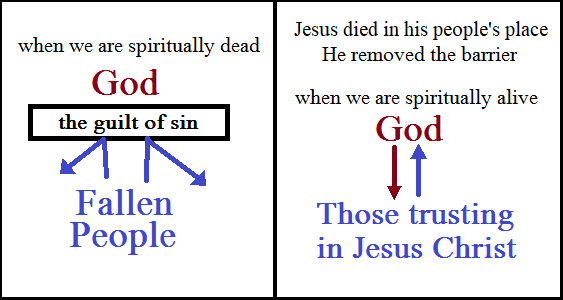Directing Our Prayers to God
by Bob Burridge ©2012
(Westminster Shorter Catechism Question 100)
(Watch the Video)
Prayer in one form or another is part of nearly every religion. We are all created with a need to communicate with God. The problem is our fallen nature. Sin confuses things and prayer is no exception.
Some become enemies of prayer. They admit to no need for it. In trying to push God out of their conscience they would ban it from every public place if they could. They are not content to refuse to pray on their own, they do not want to see others doing it either.
Some confuse prayer by treating it as if it was little more than a magical incantation. They imagine that the speaking of certain words have a power of their own to make things happen the way they want.
Some think of prayer as a way to advise God about what they believe is really best. They think that if they could just get God to listen to their advice, things will work out better than if God decided on his own what was best.
Some pray to God just to get what they want. To them it’s like making a wish list. People register for wedding and shower gifts at their favorite stores and websites, so they figure that prayer works about the same way. They think of God as a business that dispenses blessings when ever they are applied for, as long as we ask in just the right way.
There are also those who approach God casually as if he was their equal, or someone who owes them a favor. However, that’s not at all what prayer is about. We need to know what God says it is, and how it should be done.
Jesus gave us a model to teach us the right way to pray.
In Matthew 6:9 Jesus introduced his model prayer by saying, “In this manner, therefore, pray: …” A good accurate translation of the first part of verse 9 is, “Therefore you should pray this way:” The Greek words are houtos oun proseuchesthe humeis (Οὕτως οὖν προσεύχεσθε ὑμεῖς·) .
The “therefore” [oun (οὖν)] builds upon the warnings against hypocrisy in the section just before this. Prayer is not a way to display piety, to impress people, or to draw attention to yourself. It’s a humble way to really communicate to God. It therefore needs to honor and please the one you are addressing in your prayer.
Here in the Sermon on the Mount Jesus gives us an example to teach us how to pray. We usually call it The Lord’s Prayer. The first part tells us about the one to whom we direct our prayers.
We come to God as “our Father”
The Bible tells us that God is not everybody’s Father in the same way. As Creator, all creatures owe their existence to him as their Father in the limited sense of giving them existence and life. Even those who are his most determined enemies, live and are cared for by his provisions. All our abilities and opportunities are his gifts. He sustains all of nature by upholding what we call natural laws. In this very limited sense God is the Father of all creation. It is this that all the more condemns the lost who fail to give him the glory for all they have.
There is yet another way he is the Father of some but not of others. He is specially the Father of his spiritually adopted children. Out of the unworthy human race, God chose some to be his spiritual family. He did not choose them because they were better in any way. They were chosen by grace alone. God promised by covenant to pay for their sins, and to adopt them as his own children. Throughout the Bible God is specially called the Father of his covenant people.
To Israel Moses said in Deuteronomy 32:6 “… Is He not your Father, who bought you? …” The prophet in Isaiah 63:16 cried out on behalf of Israel, “… You, O Lord, are our Father; …” In Isaiah 64:8 it was said, “But now, O Lord, You are our Father; …”
Paul wrote to the church in Romans 8:15 “For you did not receive the spirit of bondage again to fear, but you received the Spirit of adoption by whom we cry out, ‘Abba, Father.’ ” And here in the Lord’s Prayer, Jesus teaches us to pray to God as our Father.
God is not the Father of all people in that special way. The sin of Adam and our own sins alienate us from God. Only those redeemed by the death of Jesus are adopted into his family. He did not pay the debt for all, but for only some chosen by grace. If you trust in Jesus alone for your salvation, and you are truly sorry for your sins, it is not your doing. There is no reason for pride. Your faith and conviction should make you humbly thankful for a blessing you could never deserve.
This is one of the most denied, most disliked, yet most clear messages of the Bible. In Ephesians 1:3-5 Paul explained it this way, “Blessed be the God and Father of our Lord Jesus Christ, who has blessed us with every spiritual blessing in the heavenly places in Christ, just as He chose us in Him before the foundation of the world, that we should be holy and without blame before Him in love, having predestined us to adoption as sons by Jesus Christ to Himself, according to the good pleasure of His will,”
Jesus had a very different message than what the Pharisees believed about their relationship with God as their Father. In John 8:44 he told them, “You are of your father the devil, …”
In First John 3:1 it says, “Behold what manner of love the Father has bestowed on us, that we should be called children of God! Therefore the world does not know us, because it did not know Him.”
God’s special redeeming love is not universal according to the Bible. The Universalists reject the Bible because they are not able to accept that fact. They teach that all humans are God’s children in that special way. They deny that man is separated from God by sin. Their idea of the “Brotherhood of Men and the Fatherhood of God” appeals to the lost heart. The problem is, it’s simply not true. It’s like telling a seriously ill patient that he’s not really sick. He might like to hear that kind of news, but if it makes him ignore treatment the results are tragic. Jesus said in John 14:6, “… No one comes to the Father except through me.”
It is understandable that those still blinded by sin would prefer what is not true. This is exactly how Paul explained it in 2 Thessalonians 2:11, “And for this reason God will send them strong delusion, that they should believe the lie,” In the first chapter of Romans he said that they, “suppress the truth in unrighteousness” … and “exchanged the truth of God for a lie.”
God’s people have a wonderful promise in calling God their Father. He is the perfect father no human could ever be. Even the best of human parents are imperfect. They could always learn to love and to care for their children with more patience, compassion, and skill. When human parents try to control all that happens to their children, it only leads to their own frustration, and to their children’s exasperation. But as God’s children we pray to a Father who cares for us perfectly. He knows what is really best for us, and he has the power to see that it happens. When he allows things into our lives that are painful or that we don’t understand, it’s not because he overlooked something or that he doesn’t love us. We must remember that we don’t yet understand how it all fits into his loving plan. In our uncertainties, we can still rest in his perfect love and power. God never fails us. He gave us life, redeems us, and provides peace, comfort and hope for his children. So we come to him with a deep sense of humble gratitude. We honor him and stand in awe of him.
This does not mean that all our prayers have to begin with the words “Our Father.” This is a model prayer. Jesus is not just giving us words to be repeated. It’s the meaning that’s important. There are many prayers in the Bible that do not begin that way. For example, in Acts 1:24 the prayer begins with “You, O Lord …”. In Acts 4:24 the people prayed, “Lord, you are God …”
The first Christians were students of the Bible. Their prayers usually follow the patterns in the Psalms. They understood that they were God’s children by grace through Christ, so they thought of God as their Father in that special sense. Sometimes Biblical prayers are directed to Jesus Christ as God the Son, our Mediator. In Revelation 22:20 John’s brief closing prayer is “Come, Lord Jesus!” The Holy Spirit is not the usual object of direct prayer. Mediating with God’s children is primarily the Son’s work. The Holy Spirit ministers as sent to us by the Father and the Son.
All our prayers are to be directed to God only. It is a horrible sin to pray to angels, or to or through dead humans, even specially saintly ones. Angels are spirit beings who may carry out the Father’s instructions, but they do not follow our instructions, and they never act on their own. No direct appeal to angels is ever approved in Scripture. Biblically, it is a serious sin against God and a violation of the First Commandment to pray to or through any created being, be they humans or angels.
When we pray to our Father we
understand that he is “… in heaven …”
The most literal reading is “… the one who is in the heavens” ho en tois ouranois (ὁ ἐν τοῖς οὐρανοῖς·)
The children’s catechism wisely tells us that “God is everywhere”. In 1 Kings 8:27 it says, “But will God indeed dwell on the earth? Behold, heaven and the heaven of heavens cannot contain You. How much less this temple which I have built!” That means that God cannot be located in just one particular place. We call this his Ubiquity – “God is everywhere.”
He is never in one place more than he is in any other place. He is altogether completely everywhere. We call this God’s Immensity – “God fills all space”. Jeremiah 23:24 says, ” ‘Can anyone hide himself in secret places, so I shall not see him?’ says the Lord; ‘Do I not fill heaven and earth?’ says the Lord.”
God is also what we call Omnipresent – “He is there in everyplace personally all the time.” Psalm 139:7-10 describes this amazing quality of God, “Where can I go from Your Spirit? Or where can I flee from Your presence? If I ascend into heaven, You are there; If I make my bed in hell, behold, You are there. If I take the wings of the morning, And dwell in the uttermost parts of the sea, Even there Your hand shall lead me, And Your right hand shall hold me.”
No one can escape the presence of God. That means that his children can never become lost from him. When we pray, he is right there by our side. When we are not praying, his is still completely there, even when we are not thinking about him, even when we do things that offend him.
Children might fool their parents for awhile by hiding stashes of junk food from them, or by keeping certain misbehaviors a secret. But nothing can be hidden from God our Heavenly Father. He not only sees, he is there. With modern technology people are so worried that “Big Brother is watching,” when they should be more aware that our Heavenly Father is watching, and always has been!
So then, if God is everywhere, why direct our prayers to God “in heaven”?
Thinking of heaven as a physical place is not very helpful. It cannot be located on star charts, or with coordinates in light years from some fixed spot in the universe. People point upwards as if heaven was above them. If someone in Australia is pointing up at the same time as someone in New York City, he’s pointing out into space in nearly the opposite direction. At noon you point up toward the sun. At midnight pointing up is away from the sun.
One of the early Russian Cosmonauts said he didn’t see God or heaven in space. That did not trouble real Christians because for us heaven is not a castle floating above the clouds.
There is good Scriptural evidence that heaven is best thought of as existing in a dimension other than what we perceive in our three dimensional world of space. Mathematical multidimensional models are common today in our attempts to understand the motion of objects in the universe our God created. Heaven may not be physical in the way we experience locations and places, but it is very real, as are the angels and God who have no physical bodies.
So why pray to God “in heaven” if he is everywhere? Heaven is where God specially shows his glory and majesty. When the Bible said that God is in his Temple, it meant that he showed his glory and majesty there, not that he was more there than in other places. When it says that God is with his people in worship, it means he specially shows himself there as their Redeemer and Lord. We do not mean that he exists more in worship than any place else. Similarly he is not in heaven more than his is in every other place in his creation.
When we pray to “our Father in heaven” we focus on his majesty and glory.
Your attitude and thoughts when
praying to God are very important.
Prayer should never be done without a sincere and solemn awareness that you are speaking to the one who made all things, rules all things, and who loved you so much though you were unworthy that he made you his own dear child. When you pray, remember that he made everything you enjoy, have, and hope for. Keep in mind that he provided a costly substitute for your sins in the suffering and death of Jesus Christ. Think of the wonders of his sovereign majesty and holy glory.
These high thoughts should drive you to constant and confident prayer, the pouring out of your heart to your Heavenly Father.
Westminster Shorter Catechism Question 100: What doth the preface of the Lord’s Prayer teach us?
Answer: The preface of the Lord’s Prayer, which is, Our Father which art in heaven, teacheth us to draw near to God with all holy reverence and confidence, as children to a father, able and ready to help us; and that we should pray with and for others.
(The Bible quotations in this lesson are from the New King James Version of the Bible unless otherwise noted.)




 After Jesus died on the cross his body was laid in a tomb while his human soul went to that spiritual dimension where all go as they await the great day of resurrection. But Jesus was resurrected three days later on that Resurrection Sunday. At that time his human body was changed into a glorified form and re-joined with his human soul again.
After Jesus died on the cross his body was laid in a tomb while his human soul went to that spiritual dimension where all go as they await the great day of resurrection. But Jesus was resurrected three days later on that Resurrection Sunday. At that time his human body was changed into a glorified form and re-joined with his human soul again. 